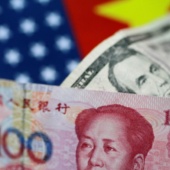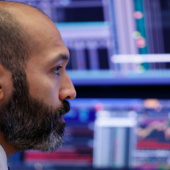(Bloomberg) — Asian stocks fell to the lowest level in almost two months before US inflation data that may further sap confidence in the pace of Federal Reserve interest-rate cuts.
Most Read from Bloomberg
Equity benchmarks in Tokyo and Sydney retreated while the MSCI Asia Pacific Index dropped to the lowest since September after the S&P 500 declined on Tuesday. The Bloomberg Dollar Spot Index was steady, and the yen approached the key level of 155. The MSCI Emerging Markets Currency Index is close to erasing its gains for the year.
Treasury 10-year yields were little changed after surging 12 basis points on Tuesday, while Australia’s equivalent jumped nine basis points in early trading Wednesday. Traders are now pricing in about two US rate cuts through June, against almost four seen at the start of last week.
Investors are positioning ahead of US data due Wednesday that is expected to show the overall consumer price index probably increased 0.2% for a fourth month, while the year-over-year measure is projected to have accelerated for the first time since March. Also, market watchers expect US president-elect Donald Trump’s proposed tax and tariff policies to further drive up inflation, with his key picks for administration posts signaling a tough stance against China.
Stocks in Asia opened lower “given the compounding effects of higher yields, a stronger dollar and ongoing trade uncertainties,” said Kyle Rodda, a senior market analyst at Capital.Com Inc. “There is a higher risk that inflation becomes a much bigger driver of the markets once again, with the proverbial genie not yet stuffed back into the bottle.”
Chinese stocks slumped on Tuesday following reports that Trump was poised to pick two men with track records of harshly criticizing China for key posts in his administration. That’s added to global concerns about the potential economic impact from his campaign pledges of tariffs on US imports, tax cuts and migrant deportations.
Traders are betting on further losses in Treasuries in anticipation that Trump’s planned policies will rekindle inflation and keep US interest rates high. Open interest, an indication of futures traders’ positioning in the bond market, rose for a fourth straight session in the two-year note contract, data released Tuesday show.
Fed Minneapolis President Neel Kashkari on Tuesday said he’ll be watching the inflation data closely to determine whether another interest-rate cut is appropriate at the US central bank’s December meeting.
















